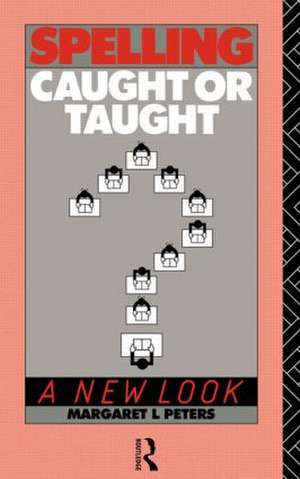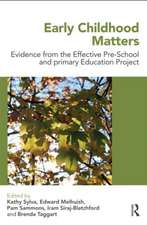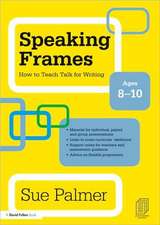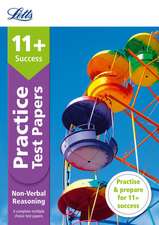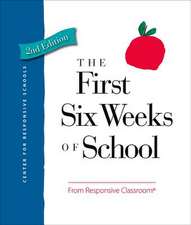Spelling: Caught or Taught?: A New Look
Autor Margaret Lee Petersen Limba Engleză Paperback – 31 ian 1985
| Toate formatele și edițiile | Preț | Express |
|---|---|---|
| Paperback (1) | 349.53 lei 6-8 săpt. | |
| Taylor & Francis – 31 ian 1985 | 349.53 lei 6-8 săpt. | |
| Hardback (1) | 763.16 lei 6-8 săpt. | |
| Taylor & Francis – 21 noi 2018 | 763.16 lei 6-8 săpt. |
Preț: 349.53 lei
Nou
Puncte Express: 524
Preț estimativ în valută:
66.90€ • 72.70$ • 56.24£
66.90€ • 72.70$ • 56.24£
Carte tipărită la comandă
Livrare economică 22 aprilie-06 mai
Preluare comenzi: 021 569.72.76
Specificații
ISBN-13: 9780415027625
ISBN-10: 0415027624
Pagini: 128
Dimensiuni: 138 x 216 x 8 mm
Greutate: 0.45 kg
Ediția:Revised
Editura: Taylor & Francis
Colecția Routledge
Locul publicării:Oxford, United Kingdom
ISBN-10: 0415027624
Pagini: 128
Dimensiuni: 138 x 216 x 8 mm
Greutate: 0.45 kg
Ediția:Revised
Editura: Taylor & Francis
Colecția Routledge
Locul publicării:Oxford, United Kingdom
Cuprins
The spelling problem, The case for good spelling, What is involved in spelling? Caught or taught? The incidental/systematic Controversy, The 1970 research 1 Verbal ability 2 Visual perception of word form, 3 Perceptuo-motor ability, 2 How is it caught? Is it caught through reading? Does poor hearing prevent the catching of spelling? Is it caught through listening? Does poor sight prevent the catching of spelling? Is it caught through looking? Would spelling be caught more easily by a simplified spelling system? 3 Teachin~ the catching of ~elling for those w 0 have not alrea y caught it, Directing attention, Attention and perception, Parents' knowledge of the spelling system, A visual skill? How do we know? Looking with intent, The importance of associative learning techniqtles in the learning of unknown words, Letter strings, Words within words, The dangers of syllabification, Use of morphemic information in learning to spell, The importance of developing a kind of imagery and of increasing the span of apprehension, Intentional communication and handwriting, Spelling in the Infant School, Intentional communication, Acquiring secretarial skills preparatory to performative activity, The importance of children developing a firm strategy for learning new words, How to learn a new word, 4 Historical approaches to the teaching of spelling, The problem of homophones, Teaching spelling by rules, Reservations about the use of rules, Test-study/Study-test method 5 Current approaches, Exploiting the visual media, Learning to spell by computers, Current materials, Correction procedures, Dictionary techniques, The self-image in spelling, Techniques of study 6 The assessment of spelling: how spelling is tested, Normative spelling tests (recall), Predictive information on spelling, A positive assessment of spelling strategies. Conclusion
Descriere
'With admirable clarity, Mrs Peters sums up what determines competence in spelling and the traditional and new approaches to its teaching.' -Times Literary Supplement
